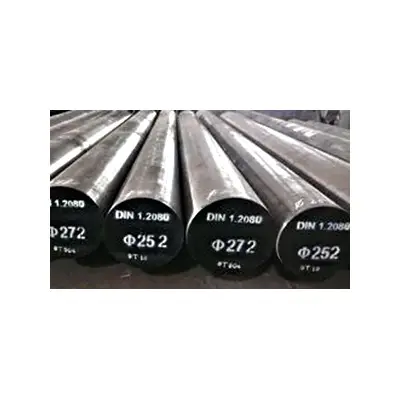1.2080 D3 tool steel is one type oil-quenched
steel; though small sections can be gas quenched after austenitization using
vacuum. As a result, tools made with type D3 tool steel tend to be brittle
during hardening.
1.2080
Applications:
1.2080 D3 tool steel is suitable for applications
such as complex blanking and forming tools for long runs and for hard and
abrasive materials. It is commonly used for other applications such as brick
and tile mould liners, master hobs for cold hobbing plastic moulds, tabletting
punches and sleeves for corrosive powders.
All
Grades Comparison:
|
ASTM
|
Material No.
|
BS
|
AFNOR
|
JIS
|
UNI
|
|
D3
|
1.2080
|
BD 3
|
Z 200 C 12
|
SKD1
|
X 21O Cr 13 KU
|
Chemical
Composition(%)
|
C
|
Si
|
Mn
|
P
|
S
|
Cr
|
|
2.00-2.35
|
0.60 max
|
0.60 max
|
0.030 max
|
0.030 max
|
11.00–13.50
|
HEAT TREATMENT:
FORGING:
Pre-heat at 900-950°C then raise temperature to 1050-1100°C. Soak until uniformly heated. D3 tool steel is relatively hard at elevated temperature. Therefore, initial hammer blows must be light and the temperature must not be allowed to fall below 1020°C until the metal begins to flow. Final forging should not be done below 900°C.
ANNEALING:
D3 tool steel is supplied in the annealed and machineable condition. Re-annealing will only be necessary if the steel has been forged or hardened by the toolmaker. To anneal, heat slowly and uniformly to 900°C. Soak for three to four hours and allow to cool in the furnace to room temperature. Re-heat to 800-1040°C and again soak for three to four hours. Allow to cool in the furnace to room temperature.
STRESS RELIEVING:
When tools are heavily machined, ground or otherwise subjected to cold work, the relief of internal strains is advisable before hardening to minimise the possibility of distortion. Stress relieving should be done after rough machining. To stress relieve, heat the steel component to 600-650°C. Soak well and cool in the furnace or in air. The tools may then be finish machined before hardening.
HARDENING:
It is preferable to heat the tools in a controlled atmosphere. If this is not possible, pack hardening is recommended. A reducing atmosphere is desirable. Pre heat the component to 750-800°C. and allow to soak at this temperature. The tools may then be brought up to 1000-1040°C for air cooling, or 980°C for oil quenching. Soak thoroughly at the temperature for thirty minutes per 25mm of ruling section, then cool or quench accordingly. It is important not to exceed 1020°C when heating for hardening.
MARTEMPERING
Martempering is an alternative hardening procedure which may be used when suitable salt bath equipment is available. By this method internal strain, distortion and risk of quench cracking are reduced to the minimum. Pre-heat dry at 300-400°C. Pre-heat in salt at 800-850°C holding in the salt for ten minutes 25mm of ruling section. Raise to the hardening temperature of 950-980°C holding in the salt for ten minutes 25mm of ruling section. Marquench in salt at 230-250°C holding in the bath for five minutes 25mm of ruling section. Cool in still air. Tempering will be necessary.
TEMPERING:
Double tempering is recommended. Tempering should be done with the least possible delay after hardening, preferably when the tools are still hand warm. Select a suitable tempering temperature, bearing in mind the service requirements. Heat slowly and uniformly. When the component has reached the desired temperature, soak for at least one hour per 25mm of thickness. The second tempering should be a repetition of the first.
Mill′s test certificate:
EN 10204/3.1 with all relevant data reg. chem. composition, mech. properties and results of testing.


